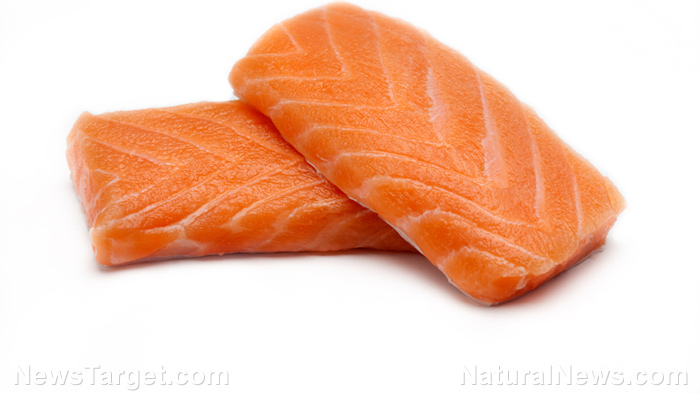
Salmon – sources, health benefits, nutrients, uses and constituents at NaturalPedia.com
Wednesday, June 21, 2017 by Frances Bloomfield
http://www.naturalpedia.com/salmon-sources-health-benefits-nutrients-uses-and-constituents-at-naturalpedia-com.html

Salmon is the common name for a species of ray-finned, anadromous fish. This means that salmon lay their eggs in freshwater, migrate to the sea or saline waters, then return to freshwater to reproduce. Salmon has earned a reputation as a health-supportive food thanks to the wealth of nutrients found in the fatty flesh.

List of known nutrients
The salmon stands as one of the premier sources of the omega-3 essential fatty acids docosahexaenoic acid (DHA) and eicosapentaenoic acid (EPA). Both omega-3 fatty acids are found in oily fish, and together they improve brain function, promote better cardiovascular health, and protect joints from unwanted inflammation. Salmon contain more nutrients, like:
- Astaxanthin
- Calcium
- CoQ10
- Copper
- Creatine
- Folic acid
- Iron
- Phosphorus
- Potassium
- Protein
- Selenium
- Vitamin B1
- Vitamin B2
- Vitamin B3
- Vitamin B5
- Vitamin B6
- Vitamin B9
- Vitamin B12
- Vitamin D
- Zinc
Medicinal uses for salmon
The omega-3 fatty acids present in salmon make the fish an excellent food for the heart. By lowering the chances of inflammation and artery blockage, salmon reduces the development of heart diseases like hypertension, atherosclerosis, and heart attack. Salmon can be a powerful weapon against other diseases, such as:
- Alzheimer’s disease
- Cancer, including colon, prostate, and kidney
- Chronic dry eye
- Dementia
- Inflammation
- Macular degeneration
- Osteoarthritis
- Parkinson’s disease
- Retinal dryness
- Type-2 diabetes
Salmon is an excellent food for bone health. Selenium, a trace mineral, protects bone marrow cells while the protein calcitonin enhances calcium uptake for greater bone density.
Regular intake of salmon can keep eye-related ailments at bay. Flavonoids and essential fatty acids have protective antioxidant qualities on the eyes, thereby diminishing the likelihood of retinal dryness, vision loss, eye fatigue, and even macular degeneration.
Those who want to lose weight should stock up on salmon. A high-protein food like salmon encourages metabolism and regulates the hormones that control appetite. Equally important to weight loss is the fact that salmon is relatively low in calories: A 3.5 ounce serving of wild salmon has a little over 182 calories, while a similar portion of farmed salmon yields only 206 calories. Meanwhile, the high concentration of potassium in salmon prevents excessive fluid retention.
Body systems supported by salmon
The heart has a lot to gain from regular salmon consumption. Besides omega-3 fatty acids, essential amino acids help by repairing cardiovascular tissue damage and by preventing artery walls from hardening. One other nutrient that supports the heart is astaxanthin, an antioxidant that gives salmon flesh its red pigment. Astaxanthin increases good (high-density lipoprotein or HDL) cholesterol and minimizes the oxidation of bad (low-density lipoprotein or LDL) cholesterol. The following organs are protected by salmon as well:
- Bones
- Brain
- Digestive system
- Eyes
- Nervous system
- Skin
Ways to use salmon
Salmon can be bought in different forms. Fresh salmon is typically sold whole or as fillets; canned, frozen, smoked, and dried salmon are available too. Canned salmon is the most convenient and inexpensive alternative to fresh salmon, with the added bonus of maintaining the same nutritional profile.
As a highly versatile fish, salmon can be prepared and cooked in a variety of ways. Salmon is delicious baked, grilled, fried, and poached. This fatty fish does well as a chowder or patty, and pairs nicely with rice and green, leafy vegetables.
Since salmon is easy to digest, elderly or sick individuals who struggle to keep food down can turn to this fish for high-quality protein.
Where to learn more
- Boost Energy Naturally: 24 Must-Use Tips To Improve Energy
- Salmon – A superfood that fills in the gaps
- Why Wild Salmon Is Better Than Farm-Raised
- The superfood power of wild caught salmon
- Delicious, simple seasoned salmon
Summary
Salmon supports bone health.
Eating adequate amounts of salmon can reduce the risk of developing eye-related ailments.
Salmon is also an excellent weight-loss aid.
Sources include
WHFoods.com
AuthorityNutrition.com
TheHealthSite.com
OrganicFacts.net
AllRecipes.com
Tagged Under: Tags: salmon





